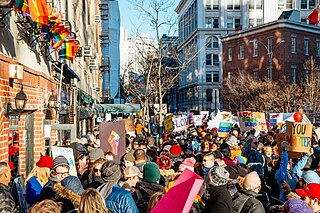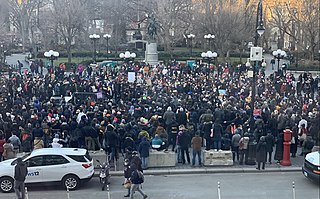
"Death to America" is an anti-American political slogan widely used in Iran, Afghanistan, Lebanon, Yemen, Iraq, Pakistan and North Korea. Originally used by North Korea since the Korean War, Ruhollah Khomeini, the first Supreme Leader of Iran, popularized the term. He opposed the chant for radio and television but not for protests and other occasions. The literal meaning of the Persian phrase "Marg bar Âmrikâ" is "Death to America". In most official Iranian translations, the phrase is translated into English as the less crude "Down with America". The chant "Death to America" has come to be employed by various anti-American groups and protesters worldwide.

Amy Kremer is an American political activist known for her roles in the Tea Party movement and as a supporter of Donald Trump. She became involved in the Tea Party movement in 2009 and campaigned as part of the Tea Party Express until 2014. During the 2016 presidential election she was a co-founder of two political action committees supporting Trump's campaign, and following Trump's loss in the 2020 presidential election she supported attempts to overturn the election result. In 2017 she unsuccessfully ran for the U.S. House of Representatives in a special election in Georgia's 6th congressional district as a Republican.

The Proud Boys is an American far-right, neo-fascist militant organization that promotes and engages in political violence. The group's leaders have been convicted of violently opposing the federal government of the United States, including its constitutionally prescribed transfer of presidential power. It has been called a street gang and was designated as a terrorist group in Canada and New Zealand. The Proud Boys are opposed to left-wing and progressive groups and support President Donald Trump. While Proud Boys leadership has denied being a white supremacist organization, the group and some of its members have been connected to white supremacist events, ideologies, and other white-power groups throughout its existence.

Protests against Donald Trump have occurred in the United States and internationally since his entry into the 2016 presidential campaign. Protests have expressed opposition to Trump's campaign rhetoric, his electoral win, his first inauguration, his alleged history of sexual misconduct and various presidential actions, most notably his travel ban in 2017 and aggressive family separation policy in 2018. Some protests have taken the form of walk-outs, business closures, and petitions as well as rallies, demonstrations, and marches. While most protests have been peaceful, actionable conduct such as vandalism and assaults on Trump supporters has occurred. Some protesters have been criminally charged with rioting. The largest organized protest against Trump was the day after his first inauguration; millions protested on January 21, 2017, during the Women's March, with each individual city's protest taken into consideration, makes it the largest single-day protest in the history of the United States. Following Trump's victory in the 2024 presidential election, a new wave of protests was held in reaction to his second presidency.

The Women's March was a worldwide protest on January 21, 2017, the day after the first inauguration of Donald Trump as the president of the United States. It was prompted by Trump's policy positions and rhetoric, which were and are seen as misogynistic and representative as a threat to the rights of women. It was at the time the largest single-day protest in U.S. history, being surpassed 3 years later by the George Floyd protests. The goal of the annual marches is to advocate legislation and policies regarding human rights and other issues, including women's rights, immigration reform, healthcare reform, disability justice, reproductive rights, the environment, LGBTQ rights, racial equality, freedom of religion, workers' rights and tolerance. According to organizers, the goal was to "send a bold message to our new administration on their first day in office, and to the world that women's rights are human rights".

Numerous protests in opposition to Donald Trump took place during his candidacy then his presidency. The demonstrations were largely organized and made up of left-wing American citizens throughout the United States. Protests at times were attacked by Trump-supporters and sometimes violent towards Trump supporters.

"Not My Presidents Day" was a series of rallies against the president of the United States, Donald Trump, held on Washington's Birthday, February 20, 2017. Protests were held in dozens of cities throughout the United States. Demonstrations were also held outside London's Houses of Parliament.

There were several protests organized by the LGBTQ community against the policies of United States President Donald Trump and his administration.

The March for Science Portland was a protest held in Portland, Oregon. This local protest was part of the March for Science, a series of rallies and marches in Washington, D.C., and over 600 cities across the world on April 22, 2017. Portland Science Advocates organized the march in support of science and to protest President Donald Trump's plan to cut funding for the Environmental Protection Agency and the National Institutes of Health. Funding for the event, which cost approximately $30,000, was crowdsourced.

The Unite the Right rally was a white supremacist rally that took place in Charlottesville, Virginia, from August 11 to 12, 2017. Marchers included members of the alt-right, neo-Confederates, neo-fascists, white nationalists, neo-Nazis, Klansmen, and far-right militias. Some groups chanted racist and antisemitic slogans and carried weapons, Nazi and neo-Nazi symbols, the valknut, Confederate battle flags, Deus vult crosses, flags, and other symbols of various past and present antisemitic and anti-Islamic groups. The organizers' stated goals included the unification of the American white nationalist movement and opposing the proposed removal of the statue of General Robert E. Lee from Charlottesville's former Lee Park. The rally sparked a national debate over Confederate iconography, racial violence, and white supremacy. The event had hundreds of participants.

The 2018 Women's March was a global protest that occurred on January 20, 2018, on the anniversary of the 2017 Women's March.

Matthew Maddock is an American politician in the Republican Party serving as a member of the Michigan House of Representatives. His district, the 51st, represents areas covering part of Oakland County. In his first term, Maddock was appointed to be the Chairman of the House Appropriations Subcommittee on Transportation, as well as Chairman of the Joint Committee on Administrative Rules. A Republican, Maddock was first elected in 2018. Prior to being elected to the 110-member Michigan House of Representatives, he was a businessman in Oakland County.

Amy Siskind is an American activist and writer. She is the author of The List: A Week-by-Week Reckoning of Trump’s First Year (2018) and organizer of the We the People March.

The 2020 Women's March was a double protest that was held on January 18 and October 17, 2020, in Washington, D.C., and across the United States. Many people in countries around the world also participated in the women's global march. The demonstration follows similar protests in 2017, 2018, and 2019.

On January 6, 2021, the United States Capitol Building in Washington, D.C., was attacked by a mob of supporters of then-president Donald Trump in an attempted self-coup, two months after his defeat in the 2020 presidential election. They sought to keep him in power by preventing a joint session of Congress from counting the Electoral College votes to formalize the victory of the president-elect Joe Biden. The attack was unsuccessful in preventing the certification of the election results. According to the bipartisan House select committee that investigated the incident, the attack was the culmination of a seven-part plan by Trump to overturn the election. Within 36 hours, five people died: one was shot by the Capitol Police, another died of a drug overdose, and three died of natural causes, including a police officer who died of natural causes a day after being assaulted by rioters. Many people were injured, including 174 police officers. Four officers who responded to the attack died by suicide within seven months. Damage caused by attackers exceeded $2.7 million.
The following article is a broad timeline of the course of events surrounding the attack on the United States Capitol on January 6, 2021, by rioters supporting United States President Donald Trump's attempts to overturn his defeat in the 2020 presidential election. Pro-Trump rioters stormed the United States Capitol after assembling on the Ellipse of the Capitol complex for a rally headlined as the "Save America March".

Stop Asian Hate was a slogan and name of a series of demonstrations, protests, and rallies against violence targeting Asians, Asian Americans, and others of Asian descent during the COVID-19 pandemic. It began in the United States in 2021 in response to racial discrimination against Asian Americans relating to the COVID-19 pandemic.

















